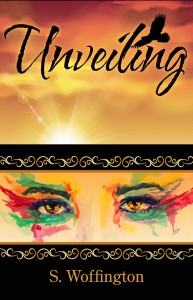Writing Historical Fiction
 Today S. Woffington shares her journey from reluctant history student to avid author of historical fiction. Her new novel, Unveiling, is available as an ebook and in print on Amazon. Unveiling is the story of Sara—a spirited, young Saudi woman—who is passionate about preserving and expressing her ancient heritage through her art. But this seemingly simple goal puts her at odds with her prominent family and the traditions of her heritage, which demand she veil her artist’s eyes. Forced to choose between her two greatest passions, Sara escapes to America, only to find that unveiling entails far more than the removal of a black piece of cloth. This act of defiance thrusts Sara into a perilous triangle involving family, government, and a relentless suitor. Only by finding the courage to unveil her own heart can she paint her destiny. To learn more about this new novel, view the book trailer.
Today S. Woffington shares her journey from reluctant history student to avid author of historical fiction. Her new novel, Unveiling, is available as an ebook and in print on Amazon. Unveiling is the story of Sara—a spirited, young Saudi woman—who is passionate about preserving and expressing her ancient heritage through her art. But this seemingly simple goal puts her at odds with her prominent family and the traditions of her heritage, which demand she veil her artist’s eyes. Forced to choose between her two greatest passions, Sara escapes to America, only to find that unveiling entails far more than the removal of a black piece of cloth. This act of defiance thrusts Sara into a perilous triangle involving family, government, and a relentless suitor. Only by finding the courage to unveil her own heart can she paint her destiny. To learn more about this new novel, view the book trailer.
Writing Historical Fiction
Round about middle school, I realized that I hated history class. That distaste lasted all through high school. English included fun fictional stories, and I loved to write; science fascinated me; I even liked math. But history required memorizing names and dates and learning about people long dead. What was the point?
What changed that was a novel. For my nineteenth birthday, a friend gave me Susan Howatch’s Cashelmara, a novel set in 19th century England and New York, shortly after the Irish famine. I nodded and said, “Thank you,” to my friend with a thought not to read it. But I opened the book, and I finished it quickly. Through a fictional setting and characters, history suddenly, emotionally, and forevermore came to life for me. I couldn’t wait to pick up the next novel, and I turned to the classics, Madame Bovary and stories from 1001 Arabian Nights, the latter of which was fortuitous, since I moved to Saudi Arabia when I was twenty-two.
 In Riyadh, I met a Saudi Artist, Safeya Binzagr, and the seed of my novel was planted
In Riyadh, I met a Saudi Artist, Safeya Binzagr, and the seed of my novel was planted. A fictional main character, Sara, also an artist, came to life, nagging me to write her story. I set it in a time when Saudi Arabia, and its people, faced prosperous upheaval from the influx of oil money. But I didn’t know enough to write the story. I needed to know the history of Saudi Arabia and its key players. I spent a great deal of time reading biographies and autobiographies of travelers to the country throughout the ages, as well as historical texts. I also needed to learn the craft of fiction. I completed the humanities honors program at UCI, and then the MFA program in creative writing from Chapman University. And then I set out, like Susan Howatch, to create vivid characters, set in a real place and time.
Just as I knew Sara, the structure of Unveiling came to me: I would incorporate a few ancient stories, like 1001 Arabian Nights, stories that tied into the present; I would also incorporate calligraphy and poetry—one could not accurately tell a story of Saudi Arabia without these elements. It was a risk, according to many agents and editors. That leads to the first and most important tip I can offer other writers (historical or otherwise)—listen and contemplate, but if you believe in your idea, if it stays with you, do it. Follow your heart.
Keys to Writing Historical Fiction
During this journey, I have learned a few key rules about writing historical fiction: first, never let the history overshadow the immediate story and characters; second, Hemingway was right—you’ll only use the tip of the iceberg of what you’ve learned, and the rest, the majority, will sit below the surface, out of sight—and, third, do not get lost in research. Over the course of several edits, I became ruthless, taking out eighty pages and an entire ancient story that just didn’t fit. The immediate story is what pulls the reader through, and writers of historical fiction must resist trying to insert all of the interesting facts gleaned in research. Only use what the story and the characters require. The ninety percent sitting below the surface is still invaluable to the writer—it will enable you to write with confidence and authenticity. You will know how each character’s history colors his thoughts and actions, and you’ll be able to create backstories based on previous events that occurred in the characters’ lives. Historical writers love to research, love to learn. I spent an entire summer losing myself, moving from historical tangent to historical tangent. I did not write. I knew that if I could not sit down and actually write, the book would never be born. I now only research exactly what I need to know to write the next scene.
Here is a short list:
- Learn the craft of fiction
- Research the history; in general at first, and then specific years or events—just what you need to know to write accurate, believable scenes
- Do not get lost in research
- Remember that the main story and its characters are paramount—not the history
- Research is not writing. Sit down and write, scene to scene, from beginning to end
- Edit ruthlessly. Make it tight. Make sure the story is moving forward as quickly as possible without hindrance from the history or other elements
Besides writing and editing fiction, I currently teach English, Algebra I, and history to middle schools students, and I strive to make history as fun as the other subjects. I try to relate the history like a story: “History is real people and real stories,” I say. “It’s who did what to whom, when, where, why and how.” I show them pictures of the real historical figures, so they can put faces to the stories. I research the lives of key players (going beyond what is in the text book), so that I can offer tidbits that will make the people seem like real humans with real flaws and concerns. I utilize fiction too, having my students write a Beowulf saga of their own, or a slave diary, or a journal of a soldier fighting in the Civil War. They write and perform Japanese Noh plays, and Greek plays and epic poems, like Sophocles and Homer.
Please comment
History is now my favorite subject. Reading and writing historical fiction is my passion. I hope you enjoyed this blog post, and I welcome you to my website (swoffington.com), or you can like me on Facebook and follow me on Twitter .
Please share your experiences reading and writing historical fiction. How do you balance research and story?
Tags: Arabic culture, historical fiction, Saudi Arabia, veiled